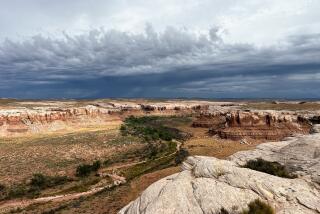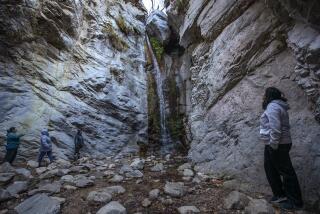At Mt. Rushmore, Bush Stands Firm on Security
- Share via
MT. RUSHMORE NATIONAL MEMORIAL, S.D. -- Using four sculpted icons of American democracy as his silent backdrop, President Bush said Thursday that he was steadfast in refusing to yield to Senate Democrats’ modification of the legislation creating the Department of Homeland Security.
Bush visited the monument--far from the ports and borders that suggest vulnerability--to rally support for the measure, which Senate Democrats say would unfairly restrict the rights of federal workers by exposing them to arbitrary shifts in assignment.
He also expressed sympathy for farmers and ranchers suffering from the worst drought in South Dakota since the Dust Bowl years of the 1930s, but he offered them no new federal assistance.
The drought and the federal response to it have become factors in a tight Senate race between Tim Johnson, the Democratic incumbent, and his Republican challenger, Rep. John R. Thune.
Bush spoke under the unblinking gaze of four presidents carved into the mile-high mountainside. The 60-foot busts of George Washington, Thomas Jefferson, Theodore Roosevelt and Abraham Lincoln looked eastward into the sun as the 43rd president delved into the nitty-gritty of Washington’s political debate.
The House has passed the homeland security bill that Bush proposed, but its critics in the Senate say it would remove protections provided by union-negotiated agreements.
“I’m a little worried about some of the noise I hear,” the president said. “I don’t want our hands tied so we cannot do the No. 1 job you expect, which is to protect the homeland. I need to be able to shift resources without a time-consuming approval process.
“We’re trying to have the capacity to respond to the needs of the American people. Unfortunately, the bill in the Senate right now won’t let me do that.”
The proposed department was designed to incorporate the work of more than 100 government agencies, scattered across multiple departments, so that the work of protecting the United States from terrorist attack could be coordinated by one Cabinet secretary.
Bush said the new department would be able to move money from one project to another--for example, to buy medicine to counter a biological weapon. “We don’t have that flexibility right now,” he said. “I’m not allowed to reorganize old agencies to meet new threats.”
He said the Senate bill would “micromanage the capacity of the executive branch to do the business on behalf of the American people.”
He also complained that it would remove the authority every president since Jimmy Carter has had to exempt agencies from collective-bargaining requirements if he determined that national security required such a move.
But Senate Majority Leader Tom Daschle (D-S.D.), who, along with Johnson, was invited by the White House to the speech, said later, “What we simply want to do is protect the rights of the workers.” As leader of the Senate Democrats, Daschle has been instrumental in holding up the legislation, which the Senate is likely to consider when it returns in September from its summer recess.
Daschle also dismissed Bush’s words on the drought. “There was little the president offered ... in terms of help or hope,” he said.
Bush said that the recently approved farm bill provides $180 billion in various forms of aid for agriculture, and that if farmers and ranchers need help, the money should be shifted from that bill.
“I understand what drought means to people who make a living off the land. I know how people suffer ... when there is no rain,” he said.
Bush, who discussed the economy with local residents earlier in the day, said: “I talked to ranchers who have been on their family ranch for years, wondering whether they can stay on. I talked to community leaders who wonder whether or not there is a place for young farmers and young ranchers in this society. You know, people hurt here, and I know that.
“We want to help deal with this drought. As we move forward to help our ranchers with drought relief, I expect that help to come from the $180 billion so we don’t run up additional deficits in the federal budget.”
Standing in the crowd under a black felt cowboy hat, Joseph Norman, whose family has ranched the land 20 miles north of Rapid City for more than 120 years, was not satisfied.
He said that although he supports Thune in the Senate race, “more needs to be done.”
The question of federal assistance to ameliorate the hardships of the drought has become a sensitive matter for Thune, who has argued that as a Republican, he can deliver help for the state with a Republican in the White House.
South Dakota State University has estimated that the drought is costing the state $4 million to $5 million a day, and Norman said the cost of feed is forcing his fellow ranchers to sell herds they had spent years breeding.
Johnson and Daschle have pressed the administration to provide $5 billion in relief for farmers, ranchers and small businesses.
The visit to Mt. Rushmore was the second by a President Bush. The president’s father visited on July 3, 1991, dedicating the national memorial 50 years after the carvings, carried out under the direction of sculptor John Gutzon de la Mothe Borglum.
That was a few months after the end of the Persian Gulf War, and before he went hiking and fishing in the pine-covered Black Hills here, the elder Bush celebrated under a flag so large it was lofted by helium-filled balloons as military jets streaked across the clear sky.
The weather was similarly crisp on Thursday, although the patriotic and military symbolism was on a lesser scale. And instead of going for a hike after he spoke, the younger Bush, in a dark gray suit, white shirt and blue tie--headed back to Air Force One for a trip home to his ranch near Crawford, Texas, where he is spending his August vacation.
More to Read
Get the L.A. Times Politics newsletter
Deeply reported insights into legislation, politics and policy from Sacramento, Washington and beyond. In your inbox twice per week.
You may occasionally receive promotional content from the Los Angeles Times.










